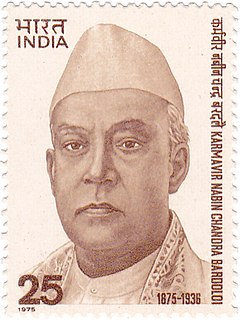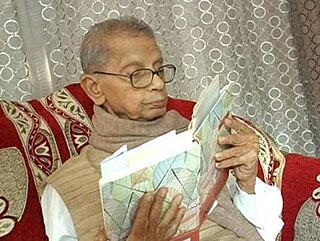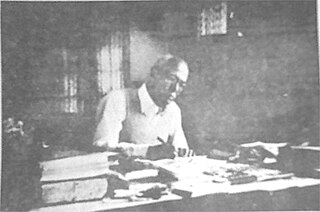 W
WJyoti Prasad Agarwala was a noted Indian playwright, songwriter, poet, writer and film maker from Assam. He was considered as Assamese cultural icon, deeply revered for his creative vision and output and is popularly called the Rupkonwar of Assamese culture. In fact, he is regarded as the founder of Assamese cinema for Joymoti (1935). His death anniversary is observed as Silpi divas in his honor.
 W
WDevi Prasad Bagrodia, is a noted writer, social worker and tea planter based in Dibrugarh in Assam, India.
 W
WNabin Chandra Bardoloi (1875–1936) was an Indian writer, politician and leader of Indian National Congress party from Assam. An Indian independence movement activist, he was a prominent leader from Assam in the Non-cooperation movement (1920–1922) of Mahatma Gandhi. The Government of India issued a commemorative postage stamp in his honour during his birth centenary year in 1975.
 W
WAtul Chandra Barua was an ACS officer and an Assamese writer. He worked for the cause of Darrangi culture and was conferred with the title "Darrang Ratna".
 W
WHem Barua was an Indian independence activist, social worker and writer from Sonitpur district of the Indian state of Assam. For his remarkable works to the people of Assam, he is called Tyagbir (ত্যাগবীৰ).
 W
WLakshminath Bezbarua, was an Indian poet, novelist and playwright of modern Assamese literature. He was one of the literary stalwarts of the Jonaki Era, the age of romanticism in Assamese literature when through his essays, plays, fiction, poetry and satires, he gave a new impetus to the then stagnating Assamese literary caravan.
 W
WBirendra Kumar Bhattacharya was an Indian writer. He was one of the pioneers of modern Assamese literature. He was the first ever Assamese writer to receive the Jnanpith Award, which was awarded to him in the year 1979 for his novel Mrityunjay(Immortal), followed by Indira Goswami in 2001. He was also a recipient of Sahitya Akademi Award in Assamese in 1961 for his Assamese novel Iyaruingam, which is considered a masterpiece of Indian literature. In 2005, a translation of the work published by Katha Books with the title Love in the Time of Insurgency was released. Another famous novel written by Bhattacharya is Aai (Mother).
 W
WKamalakanta Bhattacharya was a prominent essayist and poet belonged to the Oronodoi era of Assamese literature. He was born in 23 December 1853 in Gorehagi village, Biswanath Chariali, Sonitpur district, Assam. He was popularly known as 'Agnikobi' (অগ্নিকবি). Politically, he was strongly nationalistic. He opposed the introduction of Bengali as the official language of Assam in 1871. At the annual meeting of the Indian National Congress in 1886 in Calcutta, he participated as a delegate for Assam. In 1929 he sat as Secretary General of the Organization Culture Asam Sahitya Sabha ago. He was also the president of the Asam Sahitya Sabha in 1929 held at Jorhat district, Assam. He campaigned for the abolition of the box security regulations and promoted the education of women. He also participated in the swadeshi movement in 1905-06.
 W
WNalinidhar Bhattacharya was an Indian poet and literary critic from Assam. He won the Sahitya Akademi Award for his collection Mahat Oitijhya in 2002.
 W
WNakul Chandra Bhuyan was an Assamese historian, playwright, essayist and a short story writer.
 W
WRamnath Biswas was an Indian revolutionary, soldier, globetrotter and travelogue writer. He is known for circumnavigating the globe by bicycle.
 W
WMayur Bora is an Indian writer, critic and public speaker from Assam. Bora has 16 books to his credit, 14 in Assamese language, 1 in English and 1 book of translation in which noted litterateur Dilip Bora’s short stories were rendered into English.
 W
WHomen Borgohain is an Assamese writer and journalist. He is currently working as the editor in chief of Assamese daily Niyomiya Barta. He was awarded the 1978 Sahitya Akademi Award in Assamese language for his novel Pita Putra. Borgohain also wrote several novels, short stories and poetry. He was also the President of Assam Sahitya Sabha.
 W
WRita Chowdhury is an Indian poet, novelist and Sahitya Akademi Award recipient in the world of Assamese literature. She has been working as an associate professor in Cotton College, Guwahati, Assam in Political Science Department since 2001. Prior to that, Chowdhury had worked as lecturer from 1991 to 1996 and as senior lecturer from 1996 to 2001 in the same college. She started her teaching career as lecturer in Political Science in Diphu Government College, Karbi Anglong from the year 1989 to 1991. She is currently the Director of National Book Trust, India. She is also the wife of minister Chandra Mohan Patowary.
 W
WIndira Goswami, known by her pen name Mamoni Raisom Goswami and popularly as Mamoni Baideo, was an Indian editor, poet, professor, scholar and writer.
 W
WNagen Saikia is an Indian writer. He was formerly a professor of Dibrugarh University. Saikia had also been a member of the Rajya Sabha from 1986-1992 and was the vice-chairman of the Upper House from 1990-1992. Saikia started his career as a teacher and went on to serve in different reputed institutions in various categories. He also delivered lectures on various topics about Assamese literature, including in the US and England. He has published numerous literary essays, short stories, novels, books and articles, to his credit. Saikia was conferred with the Sahitya Akademi award in 1997 for his short stories collection Andharat Nizar Mukh and was honoured by the Mohan Chandra Sahitya Sabha in 1980 for Chinta aru Charcha. He was conferred the Sahitya Akademi Fellowship, the highest honour conferred by the Sahitya Akademi on the most distinguished Indian writers.
 W
WSrimanta Sankardev was a 15th–16th century Assamese polymath: a saint-scholar, poet, playwright, social-religious reformer and a figure of importance in the cultural and religious history of Assam, India. He is widely credited with building on past cultural relics and devising new forms of music (Borgeet), theatrical performance, dance (Sattriya), literary language (Brajavali). Besides, he has left an extensive literary oeuvre of trans-created scriptures, poetry and theological works written in Sanskrit, Assamese and Brajavali. The Bhagavatic religious movement he started, Ekasarana Dharma and also called Neo-Vaishnavite movement, influenced two medieval kingdoms—Koch and the Ahom kingdoms—and the assembly of devotees he initiated evolved over time into monastic centers called Sattras, which continue to be important socio-religious institutions in Assam and to a lesser extend in North Bengal. Sankardev inspired the Bhakti movement in Assam just as Guru Nanak, Ramananda, Namdev, Kabir, Basava and Chaitanya Mahaprabhu inspired it elsewhere in the Indian subcontinent. His influence spread even to some kingdoms as the Matak Kingdom founded by Bharat Singha, and consolidated by Sarbanda Singha in the latter 18th century endorsed his teachings.